- Home
- Anne McCaffrey
Second Wave Page 11
Second Wave Read online
Page 11
His truest and best talent, and the one he figured would take him to the top of the criminal heap in time to retire while he was still young and pretty enough to enjoy the fruits of his crimes, was his telepathy. Very few people knew about it, and it wasn’t something he advertised. Like the element of surprise in warfare, it was far less useful when others knew about it.
But the truth was, he could charm the birds from the trees if he wanted to, which he didn’t most of the time since the kind of birds that sat in trees to begin with tended to be boringly short on cash, credits, negotiable bonds, or other liquid assets.
The criminal community of Corazon, like the general population, had been much diminished by the plague to the extent that Marl had the jail all to himself. Marl found this disappointing to begin with as it gave him no chance to widen his galactic contacts with those in his chosen career field.
The food wasn’t bad. However, after months of feeding himself into a butterball because there was nothing else to do, he decided to diet. Getting healthy food was no problem, since the old woman who cooked for the jail saved her goodies for the kiddies and didn’t spoil inmates. She made what he did get tasty. Since nobody wasted any wine on him either, he had a chance to replace the expensive vintages that had been flowing through his veins for the last few months with regular blood cells instead. It wasn’t fun, but he had no choice, and besides, all that funny business on the ship with the moving bits of things smacked a bit of the DTs. He exercised as much as possible in his cell.
However, the rest of the time was spent improving his interpersonal relationships with his guards. This was aided a bit by the much-diminished communications networks. Normally young people assigned boring tasks would have been on their mobcoms, called holas here, with their friends. But the channels that had been reestablished were fewer and weaker than they had been before, and without the same range. Casual use was no longer allowed, and all channels were monitored. So the kids were bored and in need of diversion, which Marl was all too willing to provide.
The younger guards, mostly husky boys except for the occasional sweet young thing who brought him meals, were secretly a bit impressed with a desperado such as he. When they found bossing him around or bullying him unsatisfying and realized they were outclassed, he would obligingly teach them a few moves. Two of the boys returned the favor by giving him Spandard lessons. His telepathy made him a quick study, then he could work on his older guards.
These geezers were less gullible than the younger guards but were also more comfortable around people of Marl’s persuasion. Cops spent as much of their time with criminals as they did with other cops, after all.
Montoya, who had to be at least a hundred years old, started out answering every request or complaint from Marl with a story about who had lost how much in the plague and how it should have been Marl instead. He took it upon himself to scold Marl so fiercely about trying to rob the warehouse on Rio Boca that his dentures rattled.
Marl went through a routine that ended with his being tearfully remorseful but retaining an edge of defiance, not overdoing it for the skeptical old coot. He wanted to give an impression of himself as a potentially redeemable punk. As his own facility with Spandard increased, he asked the old man questions about his own losses, what was happening in the city, how it had been before and how it had changed since the plague. The more he and Montoya talked, the more he convinced his jailer that he truly wanted to change, to find a useful and valuable place in the new structure society was assuming.
The guard, as bored as the kids and, furthermore, lost without his fifth wife, his former wives, and all of the children and grandchildren who had succumbed to the plague, became increasingly willing to bring in new bits of news, even photos and films, to show Marl and discuss with him.
Jail was altogether a more educational experience than Maganos Moonbase had been.
Best of all, the nights were as peaceful as the days. Nothing moved without an easily apparent reason for doing so. All in all, Marl felt that Khorii and the Mana’s crew had truly rescued him by bringing him to this nice, safe prison where he could regroup and plan his next moves. That didn’t mean he forgave them, of course, or that they would be left out of his plans for the future. Cozy as his cell was, he had no intention of remaining there.
The day after Montoya told him that the Mana and her crew had departed for a mission, leaving behind one ship and three females from Khorii’s pacifist race, Marl waited for nightfall, then made his move.
Hafiz Harakamian now enjoyed complex acts of interspecies philanthropy almost as much as he had once enjoyed the challenge of cutthroat commerce. He consulted with the Linyaari Council on the proposed project to help the endangered LoiLoiKuans. Since much of the Council was already engaged in the plague-relief efforts, the conference was conducted by com relay. Finding his customary com screen a bit restrictive for such conferences, Hafiz employed an enjoyable bauble he had customized for the purpose. It was a globe two meters in diameter that hovered and spun in front of his desk when needed and retreated into the purple, saffron, and aqua silk tented ceiling of his office when not in use.
Its surface was split into cells, and at the top of each was the name and location of the communicant. During the conference, the cell of each speaker enlarged so that the speaker appeared life size on the surface of the globe. The other cells scrolled past in succession above, below, and beside the dominant cell, so that Hafiz could see the effect of the current remarks on each conference member. If someone made an audible aside or showed a strong reaction, their cell enlarged beside that of the speaker. If two people were engaged in a debate, their enlarged cells appeared side by side.
Hafiz was thrilled with his own ingenuity and had demanded regular teleconferences with his consultants, employees, and subcontractors since acquiring and modifying the globe. If only the intergalactic relay system could be made to function as smoothly, all would be perfect. Unfortunately at the present time, while it was reasonably reliable among planets and moons, it was far less satisfactory for communication with vessels in transit unless they were very near a stationary unit.
However, for the most part, it had been useful in keeping Aari and Acorna in touch with Khorii’s progress in plague detection and the broader rescue effort. The Condor’s com unit served to connect the remote quarantined area with Hafiz’s system.
At present Aari and Acorna, Captain Becker, and Maak peered out of one of the cells to interpret for the sii-Linyaari. These ugly multiple-horned creatures appeared in another cell. A com unit located on their favorite offshore basking place in a bay near where Acorna and the others were quarantined displayed their unfortunate and rather hostile-appearing visages.
“Would these LoiLoiKuans not prefer it if we eradicated the monster so they could remain in their own ocean?” Hafiz asked Neeva.
“Perhaps. However, the planet is in a moribund solar system as it is, and for that reason the adults have been separated from the children. Resettling them on a more vital world would allow what is left of the families to reunite.”
“Ah, so terraforming is out of the question,” Hafiz said.
“So is eradicating the sea beast,” said Liriili sanctimoniously. “Do not forget, Lord Hafiz, that we Linyaari do not practice eradication of other species.”
“Except for Khleevi?” Karina asked sweetly from her husband’s side.
“We did not exactly eradicate the Khleevi,” Liriili replied, “although we did permit the use of a defensive weapon, which does not violate our principles. However, as you know quite well, Lord Hafiz, we simply permitted the Khleevi to eradicate themselves.”
“Ahh,” Hafiz replied, pretending to study the fistful of rings on his right hand. “As you say, Madame.” Although Liriili was his and almost everyone else’s least-favorite Linyaari, she had demonstrated a talent for administering the nitpicking details of rebuilding the plague-decimated societies so he was inclined to accord her a measure of respect. “So,
no terraforming, no eradication. Perhaps a dam or a seawall.”
Neeva cleared her throat. “The beast is apparently large enough to destroy any such barrier between it and its prey. And then there would be the difficulty of installing such a barrier.”
Hafiz nodded his understanding. “Even so,” he said. “Therefore, relocation.”
“Yes,” she said. “Khorii thought perhaps the sii-Linyaari might host them in Vhiliinyar’s sea. Of course, we also need permission from the Council and particularly from the more traditional members of our race, who wish to preserve Vhiliinyar as a sacred haven for our species alone—and the sii-Linyaari of course.”
“Of course,” Hafiz agreed.
An especially clever part of his device, a stroke of genius really, was that it could usually take visual clues in the form of the body language of telepathic beings such as the Linyaari (and, much more rarely than she liked to believe, his own Karina) to determine who was having intensive nonverbal discussions with whom. Aari and the sii-Linyaari were now engaged in such a discussion.
After a moment, Aari said aloud, “The sii-Linyaari wish me to say that their sea has not, as they had hoped, been returned to its original size, which would make it easier for them to entertain guests. They feel that the sea cannot accommodate another sentient species for an extended period of time. But of course, they are sympathetic to the plight of their fellow mer folk and feel they could manage to host them on an emergency basis, so long as the refugees bear in mind the ancient proverb that guests, like dead fish, begin to stink after three days.”
“Colorfully expressed indeed,” Hafiz said, inclining his turban in the direction of the ugly creatures.
Yiitir, the distinguished Linyaari historian, said, “I would just like to interject that although we ourselves are a pacifist people, the sii-Linyaari do not necessarily share our philosophy.”
“Point taken,” said Kiiri, the current administrator of Vhiliinyar. “I fear that the people who wish Vhiliinyar to remain totally Linyaari, with the exception of our esteemed guests from the Condor, of course, do object to another species among us, even if the sii-Linyaari do not.”
“However,” interjected Naaya, administrator of narhii-Vhiliinyar, “the people of narhii-Vhiliinyar have chosen to live here as a more outwardly focused culture, and our seas, not yet fully stocked with the plant and animal species that make them a viable habitat, have no sii-Linyaari. If Uncle Hafiz could give our seas priority in our ongoing terraforming process, we may be the ideal new home for the LoiLoiKuans. While they are not Linyaari and are more humanoid than we are, from what Khorii and Neeva say, they seem to be peacefully inclined.”
Many heads bobbed in assent to this plan, and murmurs of approval swirled around the globe.
“An excellent notion,” Hafiz said. “Now then, for the details of the transfers…”
But at that moment, the screen focusing on the sii-Linyaari suddenly frothed with foam and flashing tails until for a moment Hafiz feared it might have fallen into the water. But with eyes from all across the universe watching from their cells on his globe, the froth suddenly cleared, the tails were exchanged for heads, and two sii-Linyaari surfaced and hoisted something colorful and glittering but limp and sopping wet, onto the basking rock.
All cells ceased movement as, in the central one, the gaudy object sat up, revealing itself to be a girl clad in bright but dripping robes and a great deal of what appeared to Hafiz’s shrewdly appraising eye to be quite precious jewelry. Her face was streaked with color and her white mane with a ribbon of blue dye.
She looked distressed at seeing the com camera, and said something in Linyaari that Aari automatically translated as, “Oh, no, I thought that in this time I’d be free at last of being spied upon!”
“Who are you, youngling, and how did you come to emerge from the sea?” Kiiri asked.
Karina reached out and squeezed Hafiz’s hand. Her cheeks flushed with joy and triumph, her bountiful bosom heaving excitedly, she spoke. “Acorna, dear, and Aari, you will recall my prediction? I told you that you’d be seeing your daughter within the week and here she is, right on schedule!”
Chapter 13
Khorii had imagined that without Elviiz or Marl aboard, life on the Mana would be more peaceful than it had been on the journey to Corazon. Mikaaye was quieter than either of them and seemed willing to do his part without objection or insisting on improving each and every procedure.
Their first shift out was so uneventful and pleasant that by the time Jaya replaced Captain Bates at the helm, Khorii felt rather restless. Sesseli played in the corridor with Khiindi, the ship’s kittens, and a piece of Captain Bates’s beading cord. Hap was still demonstrating the intricacies of the engine room to Mikaaye. Khorii felt rather superfluous.
Captain Bates, who relinquished the pilot’s seat, lingered on the bridge.
“I’ve got it, Captain, really,” Jaya said. “If I have any trouble, I’ll be sure and wake you.”
“I know, Jaya,” their former teacher said. “It’s just that I don’t need a lot of sleep and with everything going so well—”
“You feel at loose ends, too, Captain?” Khorii asked.
Asha Bates’s hazel eyes snapped open, then hooded as she drawled, Yeaaah, loose ends. Exactly, Khorii. Come with me, please. I have an idea.”
Khorii was surprised when the captain activated the lights in her quarters to reveal that Jaya’s parents’ quarters, which Jaya insisted the captain take since it placed her closest to the bridge, had been expanded by removing the bulkhead between it and the room formerly occupied by the first mate. Jaya remained in her old quarters across the corridor from the captain’s. She had lived there while her parents were alive, and Khorii knew it helped her feel closer to the life she had shared with them.
A beaded curtain with the image of a many-armed dancer flowed like a waterfall between the captain’s and first mate’s spaces. Except for replacing the double berth, Captain Bates had left Jaya’s parents’ quarters much as they had been, but the first mate’s quarters, beyond the curtain, were another story. The berth had been removed in favor of a table bolted to the bulkhead and deck. Cabinets with small transparent drawers were bolted to the bulkheads from the deck to overhead. Khorii recognized some of the cabinets from the bead store.
“The Mana is an older vessel, Khorii, built in the days when hard copy charts and maps were sometimes used to supplement the information provided by the ship’s computers. Our space fleets are all modeled on the naval and merchant marine fleets of old Terra, with a similar command structure, similar language and nomenclature and also, on merchant vessels like this one, remnants in the architecture of what were once considered essential features on sailing ships. Like this map case.” She patted the top of the case, which held a rack of pliers, scissors, and wire. “But we don’t need paper maps these days, and manual navigation instruments are totally anachronistic when you’re among the stars instead of looking up at them. The mate was using the case to store her jewelry, brass for her uniforms, that sort of thing. I added some smaller compartments and—”
She opened the top drawer to show stones and large beads and other special components neatly arrayed by color. The storage tab on each drawer displayed the color contained by that drawer.
“I hope to collect more as we travel, Khorii. I had most of my stones in my kit already—Steve Reamer, who used to teach jewelry making to the children on Maganos, gifted me with some of them; others I’ve had even longer.”
“You’ve really made yourself at home,” Khorii said, meaning to compliment her on her adaptability. The gray floors had been covered with carpets from the Mana’s cargo, a bright coverlet was tucked securely into the berth, which was piled with silken pillows in many colors, many embroidered with golden threads.
“I had to do something. The bulkheads were in bad repair—the one between this room and the next was brittle and full of pockmarks. But I can easily repair it with a little spot weldin
g and return it to the original layout,” Captain Bates said hastily. “No, no, Uncle Hafiz would love this!” Khorii said. “Though it’s possibly a bit understated for his taste.”
Captain Bates grinned. With her hazel eyes, light complexion, and midlength wavy brown hair, dressed as she was in her utilitarian shipsuit, she didn’t look like someone who would be the denizen of such an exotic den. “Have I ever told you anything about my background, Khorii?” Khorii shook her head. “Well, the short version is that I grew up among space nomads, pirates, gypsies, and traveling showmen. Our traditions were not based on Old Terran naval ones, so this is what home looks like to me, except I made this into a workroom for beading and other off-duty projects.”
For the first time, Khorii saw the purpose of having five slender digits on each hand instead of three larger, single-knuckled ones, as her race did.
Captain Bates caught her look, and said, “That’s no drawback. Come on, pick out some larger beads from here, and we’ll do your hair.”
A pleasant hour later, while Captain Bates’s hands combed, tugged, and braided her mane like a particularly versatile wind, they spoke of their lives, friends, what had happened in Corazon while Khorii had been away on her rescue missions and what had happened on the missions.
When Captain Bates finally lowered her hands, she said, “Now shake your head.” Khorii did so. Beads clacked and clinked together as she shook it. She rose and looked at herself in the polished metal portion of the bulkhead used to monitor grooming. Her entire head sparkled with the colors beaded and threaded into her star-clad mane, which also looked much longer, weighted as it was with the beads.

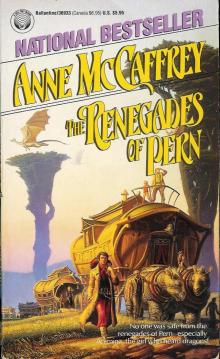 The Renegades of Pern (dragon riders of pern)
The Renegades of Pern (dragon riders of pern)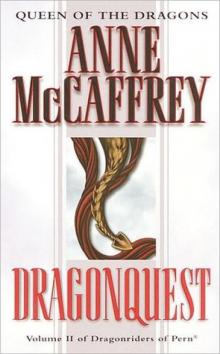 Dragonquest
Dragonquest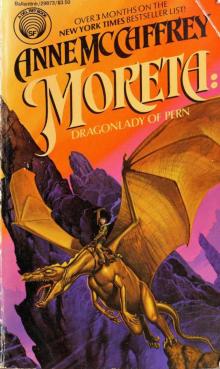 Moreta (Dragonlady of Pern)
Moreta (Dragonlady of Pern)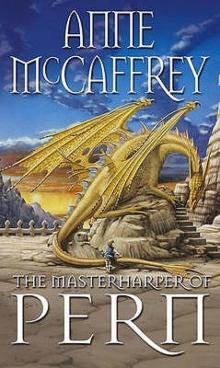 The Masterharper of Pern
The Masterharper of Pern If Wishes Were Horses
If Wishes Were Horses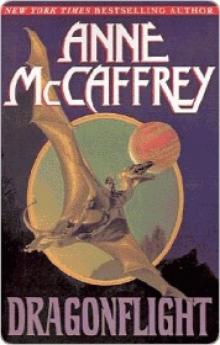 Dragonflight
Dragonflight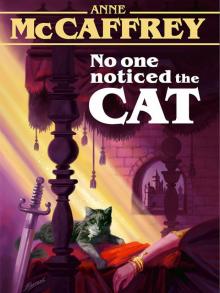 No One Noticed the Cat
No One Noticed the Cat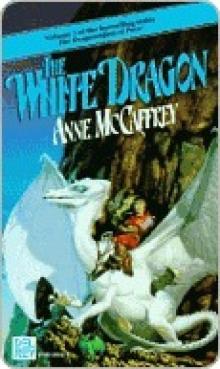 The White Dragon
The White Dragon A Gift of Dragons
A Gift of Dragons Harper Hall - Dragonsong
Harper Hall - Dragonsong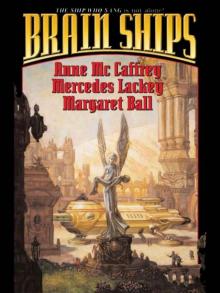 Brain Ships
Brain Ships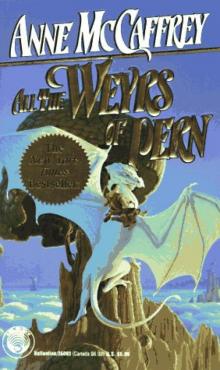 All The Weyrs of Pern
All The Weyrs of Pern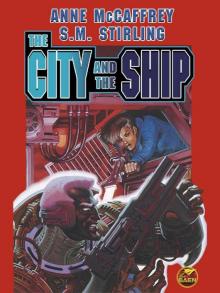 The City and the Ship
The City and the Ship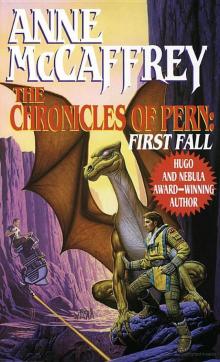 The Chronicles of Pern: First Fall
The Chronicles of Pern: First Fall Acorna’s Search
Acorna’s Search Powers That Be
Powers That Be Second Wave
Second Wave Chronicles of Pern (First Fall)
Chronicles of Pern (First Fall)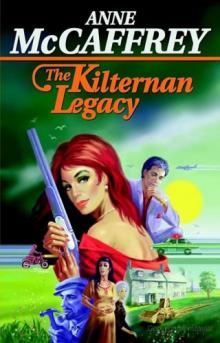 The Kilternan Legacy
The Kilternan Legacy Decision at Doona
Decision at Doona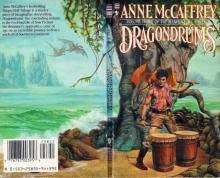 Dragondrums (dragon riders of pern)
Dragondrums (dragon riders of pern) Dragonsinger (dragon riders of pern)
Dragonsinger (dragon riders of pern)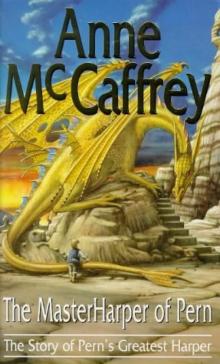 The Master Harper of Pern
The Master Harper of Pern Crystal Singer
Crystal Singer Acorna’s People
Acorna’s People Pegasus in Flight
Pegasus in Flight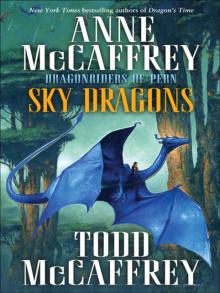 Sky Dragons Dragonriders of Pern
Sky Dragons Dragonriders of Pern Dragonriders of Pern 4 - Dragonsinger
Dragonriders of Pern 4 - Dragonsinger Treaty at Doona
Treaty at Doona Damia's Children
Damia's Children Stitch In Snow
Stitch In Snow The Rowan
The Rowan Dinosaur Planet
Dinosaur Planet The Year of the Lucy
The Year of the Lucy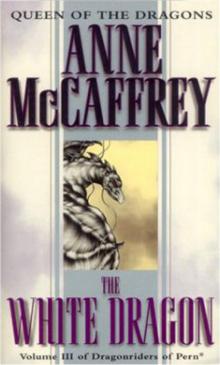 The White Dragon p-4
The White Dragon p-4 Power Lines
Power Lines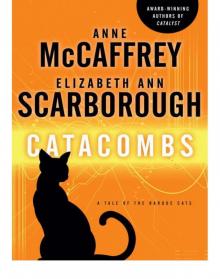 Catacombs
Catacombs Moreta
Moreta Dragonsinger
Dragonsinger Crystal Line
Crystal Line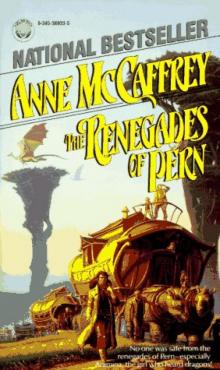 The Renegades of Pern
The Renegades of Pern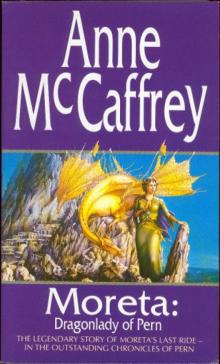 Moreta - Dragonlady of Pern p-8
Moreta - Dragonlady of Pern p-8 Deluge
Deluge The Skies of Pern
The Skies of Pern Acorna's Quest
Acorna's Quest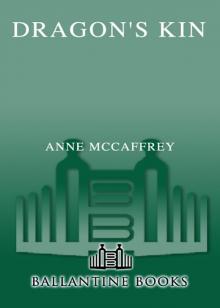 Dragon's Kin
Dragon's Kin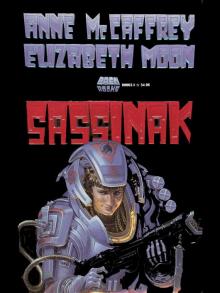 Sassinak
Sassinak![Crystal Universe - [Crystal Singer 03] - Crystal Line Read online](http://i1.bookreadfree.com/i1/03/31/crystal_universe_-_crystal_singer_03_-_crystal_line_preview.jpg) Crystal Universe - [Crystal Singer 03] - Crystal Line
Crystal Universe - [Crystal Singer 03] - Crystal Line Freedom's Landing
Freedom's Landing Acorna’s Quest
Acorna’s Quest Masterharper of Pern
Masterharper of Pern Restoree
Restoree Dolphins of Pern
Dolphins of Pern The Ship Who Saved the Worlds
The Ship Who Saved the Worlds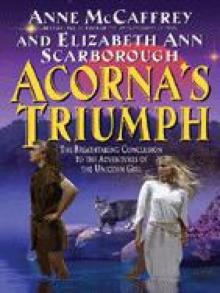 Acorna's Triumph
Acorna's Triumph Acorna's Rebels
Acorna's Rebels![[Acorna 08] - First Warning: Acorna's Children (with Elizabeth Ann Scarborough) Read online](http://i1.bookreadfree.com/i1/04/06/acorna_08_-_first_warning_acornas_children_with_elizabeth_ann_scarborough_preview.jpg) [Acorna 08] - First Warning: Acorna's Children (with Elizabeth Ann Scarborough)
[Acorna 08] - First Warning: Acorna's Children (with Elizabeth Ann Scarborough)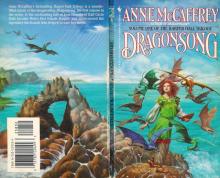 Dragonsong (dragon riders of pern)
Dragonsong (dragon riders of pern) Dragonriders of Pern 6 - Dragondrums
Dragonriders of Pern 6 - Dragondrums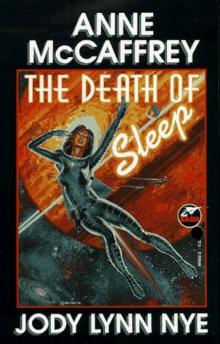 The Death of Sleep
The Death of Sleep Crisis On Doona
Crisis On Doona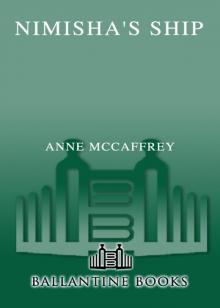 Nimisha's Ship
Nimisha's Ship Black Horses for the King
Black Horses for the King Changelings
Changelings Freedom's Choice
Freedom's Choice The Lady
The Lady The Coelura
The Coelura Catalyst
Catalyst The Unicorn Girl
The Unicorn Girl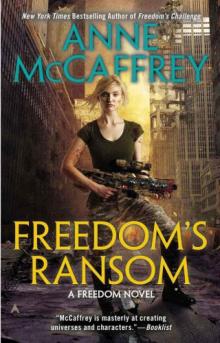 Freedom's Ransom
Freedom's Ransom Nerilka's Story
Nerilka's Story Dragon's Fire
Dragon's Fire Generation Warriors
Generation Warriors Lyon's Pride
Lyon's Pride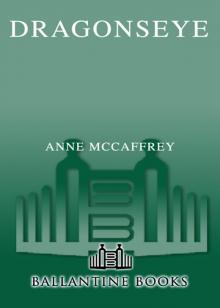 Dragonseye
Dragonseye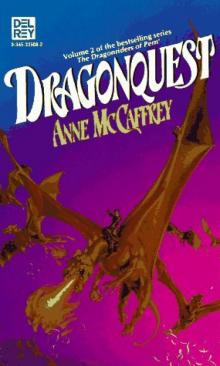 Dragon Quest
Dragon Quest Dragondrums
Dragondrums Dragonsong
Dragonsong The Mystery of Ireta
The Mystery of Ireta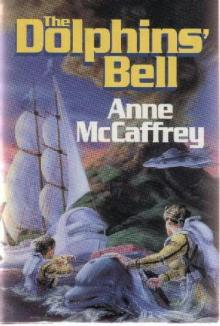 Dolphins' Bell
Dolphins' Bell To Ride Pegasus
To Ride Pegasus Power Play
Power Play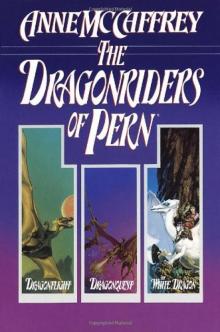 The Dragonriders of Pern
The Dragonriders of Pern An Exchange of Gifts
An Exchange of Gifts The Ship Who Sang
The Ship Who Sang Sky Dragons: Dragonriders of Pern
Sky Dragons: Dragonriders of Pern Maelstrom
Maelstrom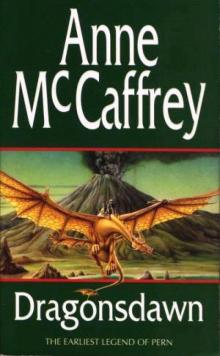 Dragons Dawn
Dragons Dawn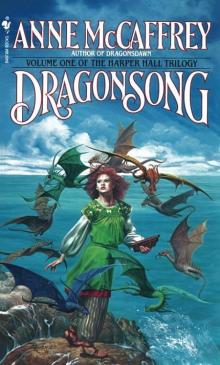 Dragon Song
Dragon Song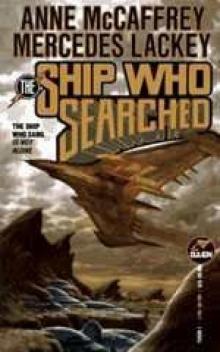 The Ship Who Searched b-3
The Ship Who Searched b-3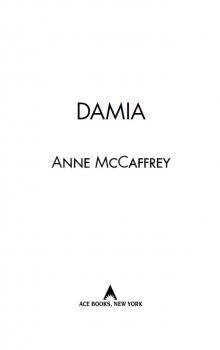 Damia
Damia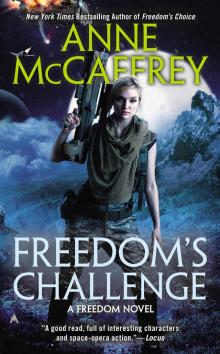 Freedom's Challenge
Freedom's Challenge